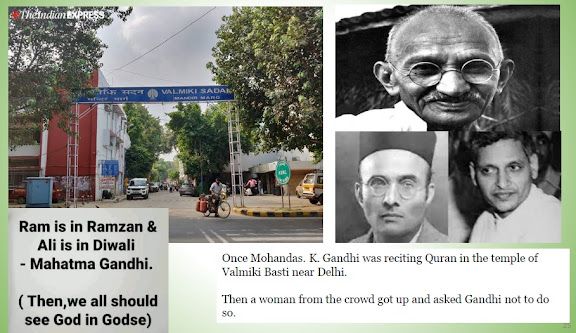Taittiriya Upanishad - Shiksha Valli
Taittriya in
Sanskrit means “From Tittiri”.
The word ‘Tittiri’
is being interpreted in two ways:
1. It refers
to Sage Tittiri who was the student of Yaska.
2. It refers
to mythical students who became “Partridges” (birds – Kouthari in Tamil) in
order to gain knowledge.
Each Chapter
of the Taittiriya Upanishad is called a Valli which literally means a medicinal
vine – like climbing plant that grows indpependently yet is attached to a main
tree.
The Taittiriya Upanishad has three chapters: the Siksha
Valli, the Ananda Valli and the Bhrigu Valli.
The first chapter Siksha Valli contains twelve Anuvaka (lessons).
The second chapter Ananda Valli, sometimes
called Brahmananda Valli contains nine verses.
The third chapter Bhrigu Valli contains ten verses.
Hence Taittiriya
Upanishads’ total Anuvaka (Lessons) is 31 verses.
But, we are here
confined to Siksha Valli (Valli means Chapater) and that too 4 Anuvaka (Lessons) of Siksha
Valli wherein Guru’s Farewell address to Shishyas who were leaving their
studies in Gurukul Ashram is mentioned.
Shiksha
means ‘Vedic Education’.
Taittiriya
Upanishad belongs to Yajurveda and is listed as number 7 of 108 Upanishads. I
is likely to be composed about 6th Century BC even before the birth
of Buddha.
Eleventh Anuvaka of
Shiksha Valli contains a list of golden rules which the Vedic teacher imparted
to the graduating students as the ethical way of life. It sounds more or less like
the Convocation address to graduating students to pursue Dharma, Artha and Kama
to the best of their abilities.
The Advices imparted
were of 6th Century BC and hence one can visualize how the Educations
System was forward and modern at those ancient days.
Even the present day
convocation addresses could be no match for those 4 Anuvakas of Siksha Valli.
The two following
famous Verses also contain in these 4 Anuvakas of Siksha Valli.
1. satyam vada, dhar-mam cara,
2. matri devo bhava, pitri devo bhava, acarya devo bhava, atithi
devo bhava
Farewell Advice to
Students
1. After teaching the Vedas, in the end, the teacher
instructs the pupil.
Speak the truth.
Perform your duty.
Do not neglect the self-study of the Vedas.
After giving the gift desired by the teacher, do not
break the chain of your progeny.
Do not neglect truth.
Do not neglect duty.
Do not neglect your health.
Do not neglect your material wellbeing.
Do not neglect the self-study and the teaching of
the Vedas.
2. Do not neglect your duties to gods and ancestors.
May your mother be honored as a goddess by you;
may your father be honored as a god by you;
may your teacher be honored as a god by you;
may your guest be honored as a god by you.
Whatever actions are free from egoism, they should
be practiced, not others.
Whatever good conduct you find among us (teachers),
that alone should be practiced, not others.
3. Those brahmanas among us who are praiseworthy,
their fatigue should be removed by offering them a seat.
What is given should be given with sincerity, not to
be given with insincerity, given plentifully, given with modesty, given with obedience,
given with kindness.
Now, if
there is any doubt in you with regard to duties or if there is any
doubt in you
with regard to your profession, learn
from righteous Brahamanas , who observe karmas and tradition in a proper manner
and are devoid of any crude mentality.
4. You should conduct yourself in such and such
manner as those brahmanas who are competent to occupy the seat of a judge, who
can discern the right from the wrong, who are not cruel, who are interested in
performing actions for the sake of dharma would behave in such sit-uations.
Now with regard to those who have been accused, you
should conduct yourself in such and such manner as those brahmanas who are
competent to occupy the seat of a judge, who can discern the right from the
wrong, who are not cruel, who are interested in performing actions for the sake
of dharma would behave in such situations.
This is the command. This is the teaching. This is
the secret teaching of the Vedas. This is the instruction. This one should
follow. This alone should be followed.
Sanskrit Version of
these 4 Anuvakas Siksha Vallai
1. vedam anucyacaryontevasinamanusasti, satyam vada, dhar-mam cara, svadhyayan ma pramadah, acaryaya priyam dhanam ahritya prajatantum ma vyavaccetsih, satyan na pramadi-tavyam, dharman na pramaditavyam, kusalan na pramadi-tavyam, bhutyai na pramaditavyam, svadhyaya pravaca-nabh-yam na pramaditavyam.
2. devapitrikaryabhyam na pramaditavyam, matri devo bhava, pitri devo
bhava, acarya devo bhava, atithi devo bhava, yany anavadyani karmani,
tani sevitavyani, no itarani, yany asmakam sucaritani, tani tvayopasyani, no
itarani.
3. ye ke casmaccreyamso brahmanah, tesam tvayasanena
prasvasitavyam, sraddhaya deyam, asradd-haya'deyam, sriya deyam, hriya deyam,
bhiya deyam, samvida deyam, atha yadi te karmavicikitsa va vrittavicikitsa va
syat.
4. ye tatra brahmanah sammarsinah, yukta ayuktah, aluksa dharmakamah
syuh, yatha te tatra varteran, tatha tatra vartthah; athabhyakhyatesu, ye tatra
brahmanah sammarsinah, yukta ayuktah, aluksa dharmakamah syuh, yatha te tesu
varteran, tatha tesu vartethah, esa adesah, esa upadesah, esa vedopanisat,
etadanusasanam, evamupasitavyam, evamu caita-dupasyam.
(Notes: Yukta ayukta
means right and wrong or what is appropriate and inappropriate and used in
reference to discerning knowledge (vicaksana jnanam). This is an important
quality for any person who performs the functions of a judge. Sammarsina means
to be qualified to sit upon the seat of a judge to deliver judgment. The suggestion
given in this verse to the young students is if they have to judge any actions
or speak against anyone who has been accused of doing wrong, they have to
follow the best practices followed by wise people in society and uphold the
values they uphold.)





Comments